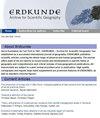作为当地技能提供者的公司?墨西哥的“技能生态系统”
IF 1.1
4区 社会学
Q3 GEOGRAPHY
引用次数: 2
摘要
经济地理学的一个重点是行动者如何促进当地的知识基础。研究通常表明,公司是当地产生的知识的接受者,而不是知识的生产者。招聘当地职业学校和大学的毕业生使公司能够发挥这一作用。然而,公司有时也充当知识提供者,为学生和学生提供学徒制或综合实习。本文关注的是这种“双重”行为的界面,它将公司与职业学校和大学联系起来。最近,技能生态系统的概念变得流行起来,它解决了当地演员网络中的这个接口。从这一概念开始,并将其融入经济地理学的辩论中,本篇文章聚焦于墨西哥,并调查了当地行为者如何将公司整合到双重活动中。基于定性方法,该研究表明,墨西哥中部高地存在一个由两部分组成的技能生态系统。较小的部分包括双重职业教育和培训,位于经济的技术“高路”部分。另一部分主要包括低技术公司,大多是不从事双重实践的小型公司。结论讨论了技能生态系统方法对未来研究的贡献。本文章由计算机程序翻译,如有差异,请以英文原文为准。
Companies as local skill-providers? The ‘skills ecosystem’ in Mexico
A focus of economic geography is on how actors promote the local knowledge base. Studies usually show that companies act as recipients of locally generated knowledge, and not as producers of knowlege. Recruiting graduates of local vocational schools and universities enables the companies to play this role. However, companies sometimes also act as providers of knowledge, in the sense that they offer apprenticeships or comprehensive internships for pupils and students. This article focuses on this interface of ‘dual’ actvities, which connect the companies with vocational schools and universities. Recently, the concept of the skills ecosystem, which addresses this interface within the local actor network, has become popular. Starting with this concept and embedding it into the debate of economic geography, this contribution focusses on Mexico and investigates how the local actors integrate companies in dual activities. Based on qualitative methods, the study illustrates that there is a two-part skills ecosystem in Mexico’s Central Highland. The smaller part consists of dual vocational education and training and is found in the technological ‘high-road’ part of the economy. The other part mainly comprises low-tech and mostly smaller companies that do not engage in dual practices. The conclusion discusses the contribution of a skills ecosystems-approach to future research.
求助全文
通过发布文献求助,成功后即可免费获取论文全文。
去求助
来源期刊

Erdkunde
地学-自然地理
CiteScore
2.00
自引率
7.10%
发文量
17
审稿时长
>12 weeks
期刊介绍:
Since foundation by Carl Troll in 1947, ''ERDKUNDE – Archive for Scientific Geography'' has established as a successful international journal of geography. ERDKUNDE publishes scientific articles covering the whole range of physical and human geography. The journal offers state of the art reports on recent trends and developments in specific fields of geography and comprehensive and critical reviews of new geographical publications. All manuscripts are subject to a peer-review procedure prior to publication. High quality cartography and regular large sized supplements are prominent features of ERDKUNDE, as well as standard coloured figures.
 求助内容:
求助内容: 应助结果提醒方式:
应助结果提醒方式:


